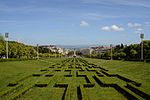Lisbon (; Portuguese: Lisboa [liʒˈboɐ] (listen)) is the capital and the largest city of Portugal, with an estimated population of 544,851 within its administrative limits in an area of 100.05 km2. Lisbon's urban area extends beyond the city's administrative limits with a population of around 2.7 million people, being the 10th-most populous urban area in the European Union. About 3 million people live in the Lisbon metropolitan area, which represents approximately 27% of the country's population. It is mainland Europe's westernmost capital city and the only one along the Atlantic coast. Lisbon lies in the western Iberian Peninsula on the Atlantic Ocean and the River Tagus. The westernmost portions of its metro area, the Portuguese Riviera, form the westernmost point of Continental Europe, culminating at Cabo da Roca.
Lisbon is recognised as an alpha-level global city because of its importance in finance, commerce, media, entertainment, arts, international trade, education and tourism. Lisbon is one of two Portuguese cities (alongside Porto) to be recognised as a global city. Lisbon is home to three companies in the Global 2000. It is one of the major economic centres in Europe, with a growing financial sector and one of the largest container ports on Europe's Atlantic coast. Additionally, Humberto Delgado Airport served 29 million passengers in 2018, being the busiest airport in Portugal, the third busiest in the Iberian Peninsula and the 20th busiest in Europe. The motorway network and the high-speed rail system of Alfa Pendular links the main cities of Portugal to Lisbon. The city is the ninth-most-visited city in Southern Europe, after Istanbul, Rome, Barcelona, Milan, Athens, Venice, Madrid and Florence with 3,539,400 tourists in 2018. The Lisbon region has a higher GDP PPP per capita than any other region in Portugal. Its GDP amounts to US$110.3 billion and thus $32,434 per capita. The city occupies the 40th place of highest gross earnings in the world. Most of the headquarters of multinational corporations in Portugal are located in the Lisbon area. It is also the political centre of the country, as its seat of government and residence of the head of state.
Lisbon is one of the oldest cities in the world, and the second-oldest European capital city (after Athens), predating other modern European capitals by centuries. Julius Caesar made it a municipium called Felicitas Julia, adding to the name Olissipo. After the fall of the Roman Empire it was ruled by a series of Germanic tribes from the 5th century; later it was captured by the Moors in the 8th century. In 1147 Afonso Henriques conquered the city and since then it has been the political, economic and cultural centre of Portugal.











